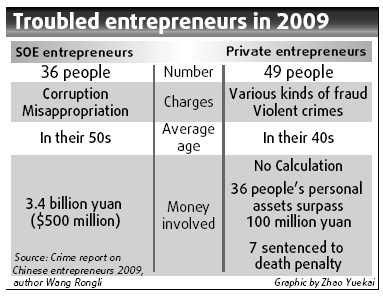Crimes rising among business elite: Report
Crimes rising among business elite: Report
08:21, January 07, 2010
New study finds entrepreneurs still need 'legal consciousness'
A growing number of Chinese entrepreneurs are committing criminal offences, and most of them enjoy high political status or social recognition, a report by a senior lawyer shows.
Wang Rongli, a Shenzhen-based lawyer, collected case files of 85 influential entrepreneurs sentenced or accused of criminal offences in 2009. A total of 36 were from State-owned enterprises (SOE) and 49 from private enterprises.
"I have watched this field for over 20 years, and I found entrepreneurial crime has grown quickly in recent years, with an increasing amount of money involved," Wang told China Daily yesterday. His report was considered the first annual crime report on Chinese entrepreneurs.
Statistics show the SOE entrepreneurs' cases involved 3.4 billion yuan ($500 million), including 932 million yuan from corruption and about 1.3 billion yuan misappropriated.

Money involved with private entrepreneurs has not yet been calculated, but 36 of the 49 people have over 100 million yuan in personal assets, and seven have already been sentenced to death.
"Accusations against SOE bosses are mainly for taking bribes, corruption or misappropriation, while private entrepreneurs tend to cross the line from different angles," Wang said.
In contrast, crimes committed by private entrepreneurs are more complicated.
"Various kinds of fraud have most frequently occurred with private companies' lust for profit, followed by violent crimes and offering bribes," he said.
But nearly all the entrepreneurs in trouble enjoyed high political status before the halos over their heads were taken off.
For example, among the SOE entrepreneurs, Chen Tonghai, who was sentenced to death in July with a two-year reprieve for taking huge bribes, was once an alternate member of the Party's central committee.
Kang Rixin, removed in August as Party secretary and general manager of the State-owned China National Nuclear Corporation, was serving as a member of the Party's central commission for discipline inspection.
Many of the private entrepreneurs also acted as members of local people's congresses or had various honorary titles.
Wang's report was considered the "first annual crime report on Chinese entrepreneurs" by the media.
He said he had worked for 10 years in SOEs or listed companies, and found the entrepreneurs lacked "legal consciousness".
"This group of entrepreneurs did not form in China until the early 1990s. And although SOE reform has gone deeper and private companies have developed vigorously these years, the legal quality of the entrepreneurs did not grow with it," Wang said.
Xu Zhengzhong, a professor with the Chinese Academy of Governance, said Chinese traditional culture and the immature legal system are also to blame.
China has a tradition of power centralization. Successful bosses tend to keep power to themselves, while the lack of checks and balances easily lead to problems, he said.
On the other hand, legal developments could not "catch up" with economic development. "Risk takers can often gain great fortunes by going into the gray area of the legal system, which means some people will fall," he said.
Source:China Daily

No comments:
Post a Comment